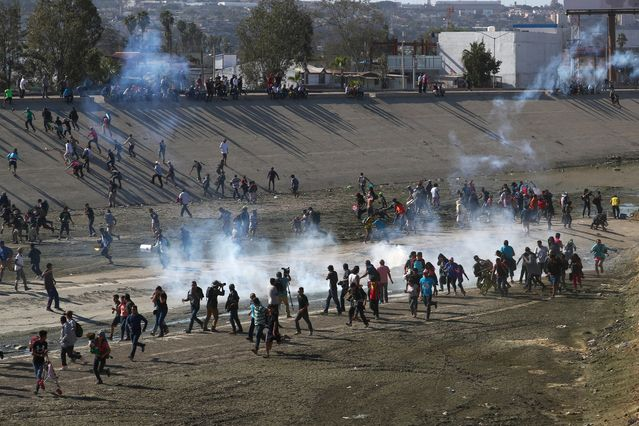May 11, 1023 by Kevin V. Harris, Senior Correspondent

Immigration Reform
With Title 42 ending, here we go again on the Immigration Reform debate
There have been numerous ideas and suggestions put forth for reforming U.S. immigration laws. Here are some of the common proposals and solutions that have been mentioned
- Pathway to Citizenship: This involves creating a process for undocumented immigrants to earn legal status and eventually become U.S. citizens. It often includes requirements such as background checks, payment of back taxes, learning English, and fulfilling other obligations.
- Deferred Action for Childhood Arrivals (DACA): Many have suggested providing a permanent solution for individuals who were brought to the U.S. illegally as children, commonly known as "Dreamers," who were protected under the DACA program. This would grant them legal status and potentially a pathway to citizenship.
- Border Security: Various proposals emphasize strengthening border security measures, such as increasing the number of Border Patrol agents, enhancing surveillance technology, and improving infrastructure along the U.S.-Mexico border to prevent illegal crossings.
- Guest Worker Programs: Some have suggested expanding or creating new guest worker programs to address labor demands in sectors such as agriculture, hospitality, and construction. These programs would allow foreign workers to enter the country legally for temporary employment purposes.
- Merit-based Immigration: This approach focuses on prioritizing immigration based on factors such as education, skills, work experience, and contributions to the U.S. economy. It aims to attract high-skilled individuals who can contribute to innovation and economic growth.
- Family-based Immigration: Family reunification has long been a key component of U.S. immigration policy. Suggestions have been made to preserve and streamline the family-based immigration system, allowing U.S. citizens and permanent residents to sponsor their immediate relatives for legal immigration.
- Temporary Protected Status (TPS): Expanding or adjusting TPS, which provides temporary legal status to individuals from countries facing armed conflict, natural disasters, or other extraordinary conditions, has been proposed as a humanitarian solution.
- Clearing Backlogs: Addressing the significant backlog of immigration cases by increasing funding, hiring more immigration judges, and improving the efficiency of the immigration court system.
- Agricultural Worker Programs: Creating specific pathways for agricultural workers to obtain legal status, acknowledging the essential role they play in the U.S. agricultural industry.
- Regional Approaches: Exploring regional approaches to immigration, such as collaborating with neighboring countries to develop coordinated immigration policies or addressing root causes of migration through foreign aid and development initiatives.
- Consider, these ideas and suggestions represent a range of viewpoints and are subject to ongoing debate and negotiation. The specific policies implemented as part of immigration reform can vary depending on political dynamics and priorities at any given time.
Solutions from the prospective of each major political party

Democratic Views
A Democratic perspective on the immigration crisis would typically emphasize comprehensive immigration reform, including pathways to citizenship, protection for undocumented immigrants, and addressing humanitarian concerns. Here's a potential solution from a Democratic standpoint.
- Pathway to Citizenship: Establish a fair and inclusive pathway to citizenship for undocumented immigrants already residing in the United States. This would involve a rigorous process that includes background checks, payment of taxes, and meeting specific criteria such as learning English and passing civics exams.
- Protection for Dreamers: Provide permanent protection, such as a path to citizenship, for individuals who were brought to the U.S. as children (Dreamers) and who have grown up and integrated into American society. This would ensure their continued ability to study, work, and contribute to the country they consider home.
- Humanitarian Policies: Implement policies that prioritize the humane treatment of immigrants, particularly vulnerable populations such as asylum seekers and families. This includes ensuring access to legal counsel, addressing the backlog of asylum cases, and providing alternatives to detention for non-violent immigrants.
- Family Reunification: Strengthen family-based immigration by reducing visa backlogs and expediting the reunification of families separated by immigration processes. This recognizes the importance of keeping families together and promoting family unity as a core value in U.S. immigration policy.
- Comprehensive Immigration Reform: Pursue comprehensive immigration reform that provides a pathway to citizenship for the undocumented population, modernizes the legal immigration system, and addresses border security through targeted investments in technology, personnel, and infrastructure.
- Economic Opportunities: Promote policies that create economic opportunities and fair working conditions for all workers, including immigrants. This involves raising labor standards, combating worker exploitation, and ensuring immigrants have access to basic labor protections and a living wage.

Republican Views
A Republican perspective on addressing the immigration crisis would likely focus on border security and the enforcement of existing immigration laws. Here's a potential solution from a Republican standpoint
- Enhanced Border Security: Prioritize securing the U.S.-Mexico border through increased funding for border patrol agents, advanced surveillance technology, and physical infrastructure, such as walls or barriers, where deemed necessary. This would aim to prevent unauthorized border crossings and reduce the flow of illegal immigration.
- Enforcement of Immigration Laws: Strengthen the enforcement of existing immigration laws by empowering Immigration and Customs Enforcement (ICE) to carry out their duties effectively. This includes expanding resources, personnel, and technology for enforcement operations to identify, apprehend, and remove individuals who have violated immigration laws.
- Merit-based Immigration: Implement a merit-based immigration system that prioritizes individuals with high skills, education, and potential contributions to the U.S. economy. This would emphasize attracting highly skilled professionals who can fill critical labor market needs and contribute to economic growth.
- Reforms to Legal Immigration: Streamline and improve the legal immigration system by reducing processing backlogs, ensuring faster and more efficient adjudication of applications, and eliminating bureaucratic hurdles. This would facilitate legal immigration for those who comply with immigration laws and seek to contribute positively to the country.
- Cooperation with Origin Countries: Foster stronger partnerships with countries from which immigrants are fleeing by promoting economic development, good governance, and the rule of law. Engaging in diplomacy and providing aid to address the root causes of migration would help alleviate the need for individuals to leave their home countries.
Again, these perspectives are broad generalizations, and actual policy proposals may vary within each political party. Immigration is a complex and multifaceted issue, and finding common ground between different perspectives is crucial for comprehensive immigration reform.
